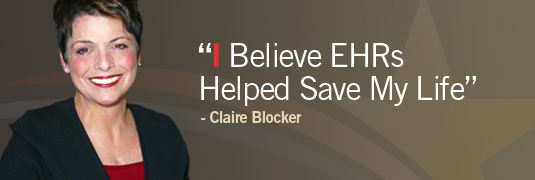Claire Blocker


“I Believe EHRs Helped Save My Life”
Claire Blocker, President and Founder of the HeartBright Foundation and WomenHeart Champion
Claire Blocker is a survivor and a WomenHeart Champion. She has survived a stroke, heart attack, quadruple bypass surgery, and now diabetes. She believes having electronic health records (EHRs) helped save her life. Through the HeartBright Foundation, which Claire established in 2003, she raises awareness and provides resources about cardiovascular disease to underserved communities in North Carolina. Her foundation also operates a clinic with 24 volunteer doctors who rely on the EHRs to make sure their patient’s health information is as up to date and complete as possible. She recalls her story during American Heart Month this February.
It all started after my four-year-old Springer Spaniel bit me on the hand. The next day, I had red streaks all across my chest. My husband rushed me to the ER and I was treated for what turned out to be pasteurella bacteria in my lymphatic system. Two and a half days later, I had a heart attack in the hospital. From there, I had quadruple bypass surgery (three of four bypasses failed within four months), three years of EECP therapy, five stents in my heart, one stent in my right renal artery, and now diabetes.
I am quite sure that I would not have had the opportunity to have lived this long if the valuable information EHRs provide to my physicians on a daily basis was not so readily available. It has been 13 years since my bypass surgery, and at 65, I feel happier, healthier, and far more balanced than I have ever been.
Managing Heart Disease with EHRs
EHRs have improved the quality of my care as a cardiovascular patient. All of my records are readily available to my cardiologist, endocrinologist, and internist. EHRs ensure that all of the physicians who provide my care are working from the same playbook to manage my cardiovascular disease and diabetes.
As a patient, keeping up with my daily medications is always a challenge. I take more than 60 pills a day (22 different medications)! When my medications are adjusted, the prescribing physician who has made the change gives me a copy of the list. This way, I can actively participate in my own care. The physician then sends the updated EHR to my team of physicians, so that we are all working off of my latest medical information. I firmly believe that patients need to be engaged in their own care. EHRs have empowered me to be a better team member and partner with my physicians.
EHRs Helped Save My Life
If a patient has a health problem and needs to be admitted to the ER at a local hospital, the physician on call can have immediate access to the patient’s information. No valuable time is wasted developing a diagnosis without knowing the patient’s medical history. This can mean the difference between life or death for someone with heart disease!
This is exactly how EHRs saved my life in the ER. My medication had given me grand mal seizures and my husband, who is my caregiver, was out of town. If the doctors did not have access to my EHR, they would have not known what caused the seizure and how to treat me.
HeartBright Foundation
I feel very blessed to be alive after everything I have been through. Each day is a gift and an opportunity to help others, which is why I founded the HeartBright Foundation. I did not want people to get as sick as I did. I started out wanting to spread awareness in underserved communities about cardiovascular disease and related issues, such as diabetes and hypertension, and then I began adding measurements and education support. Eventually, I started a clinic to provide health services for free. As an all-volunteer clinic, there is no way we can keep track of our records manually. We use a web-based EHR system so that when a doctor who is on call receives a request for medications, he or she can respond immediately by looking up the patient record on their iPhone.
In 2010, HeartBright Foundation received an award from the Association of Black Cardiologists as the model for how preventative chronic care medicine should be practiced. I know that our EHR system is an integral part of our practice model and an important part of our successful clinical outcomes and overall clinic’s success.
Claire Blocker is also a WomenHeart Champion for WomenHeart: The National Coalition for Women with Heart Disease. WomenHeart is the nation’s only patient-centered organization providing support to the 42.7 million American women living with or at risk for heart disease. Heart disease is the leading cause of death in women, killing more women more than all cancers combined. For information on free support services for women living with heart disease or to receive a free online heart health action kit, contact WomenHeart at www.womenheart.org.

